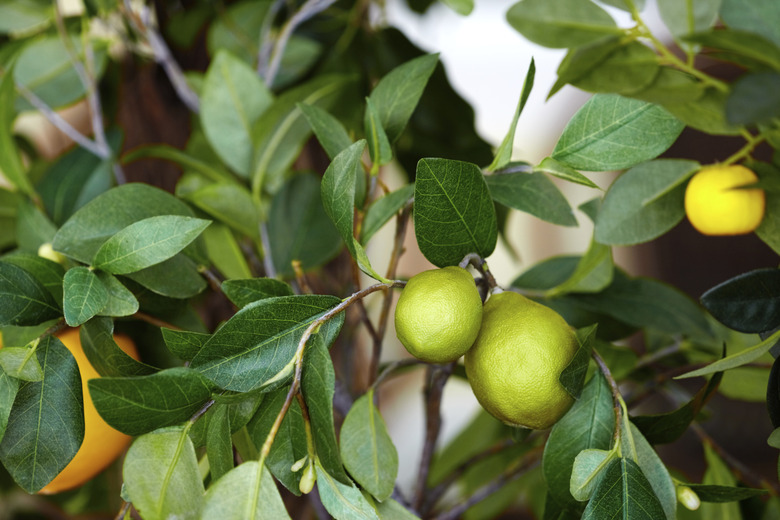Ways To Use Lemon Tree Leaves
We may receive a commission on purchases made from links.
If you grow lemons (Citrus x limon, USDA zones 9-11) at home, you likely have many favorite lemon recipes, but how can you use lemon tree leaves? Lemon tree leaves are aromatic, deep green and shiny, and useful in many ways. Because they're not toxic, they can be used widely, including in cooking. If you have access to a lemon tree, you'll be pleasantly surprised to find how many ways people use the leaves.
Tip
Lemon leaves aren't usually eaten, but they can be used in cooking to impart a citrus flavor to food and drinks. The deep green, shiny leaves also work well in decorations due to their beauty.
Characteristics of Lemon Leaves
Characteristics of Lemon Leaves
Lemon leaves cover lemon tree branches with an alternating growth pattern. Young lemon leaves appear reddish, eventually giving way to the deep green, glossy look that you see later in the season. Flip a mature lemon tree leaf over, and you'll notice a lighter green color with a matte look. Lemon tree leaves have an oblong shape, tapering toward the end to a point, and they display rippling and fine-toothed edging. While you think of the lemons as the citrusy part of the tree, the leaves are also aromatic and have a citrus flavor.
Use Lemon Leaves in Decorations
Use Lemon Leaves in Decorations
Decorators like to use lemon leaves in wreaths and garlands because of the deep green color and glossy finish. The leaves make attractive Christmas wreaths and garlands for stair banisters. Florists use sprigs of lemon leaves in flower arrangements. Add the leaves to potpourri combinations as their lemony fragrance is an excellent base for other scents in a room. Brides often use them in bridal bouquet or as part of centerpieces on the table, with lemon leaves and lemon fruits decorating the tables.
Lemon Leaves in Various Cuisines
Lemon Leaves in Various Cuisines
Lemon leaves are very common in Thai cooking. Italians use them to wrap cheeses. Greeks use lemon leaves in roasted pork recipes. In India, many cooks flavor their curries with lemon leaves. South Africans use lemon leaves in their sosatie or meat kabobs.
Many cultures use lemon leaves to flavor tea. Typically, the leaves are still fresh when used, to avoid the bitter flavor of dried leaves.
Considerations for Lemon Leaves
Considerations for Lemon Leaves
Finding fresh lemon tree leaves is difficult unless you live in a climate where they grow naturally. Overcome this is by growing your own lemon tree as an indoor/outdoor plant. You can either start a lemon tree from seeds or buy a small lemon tree to get a jump start.
Lemons are readily available, and they usually are quite seedy. Plant a few seeds straight from a lemon from the grocery store into some loamy soil and, within a few weeks, you should see some leaves poking through. Move the plant outside in the summer to get full sunlight and bring it in as an indoor plant when the air turns cooler. Although seeds from lemons at the grocery store may not produce a tree with the same fruit size or flavor, the leaves are perfectly usable.
Practical Uses for Lemon Leaves
Practical Uses for Lemon Leaves
Lemon leaves aren't necessarily eaten, but they're used to add citrus flavoring to various dishes. Wrap meat or fish in lemon tree leaves before roasting. Add lemon tree leaves to olive oil or vinegar to impart a fresh, lemony flavor into the condiment. Use lemon leaves in recipes that call for lemongrass. Add a few to fish stews for a fresh light flavor.
